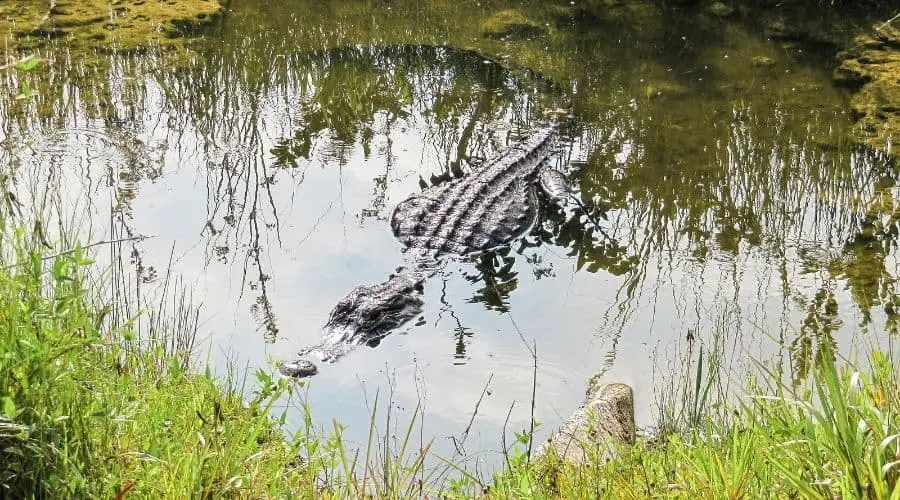Louisiana and Florida each have over a million alligators, far more than anywhere else, and all of them live in freshwater. Alligators don’t discriminate or care why the water is there or what shape it takes.
As freshwater creatures who prefer swamps, lakes, rivers, or any other suitably watery area, they’ll move in if they fit. Do alligators live in ponds?
Alligators are mainly freshwater animals that are primarily found in ponds, lakes, swamps, bayous, marshes and slow-moving rivers in Louisiana and Florida. Alligators will live in a pond as long as there is enough water to float, enough food to survive, and somewhere to lay in the sun to get warm because they are cold-blooded.
Table of Contents
How Long Will An Alligator Live In A Pond
An alligator who has moved into a pond will stay there for quite a while if it likes the environment. They may even make a home out of the pond.
These long scaly predators are not picky about where they live as long as it has what they need.
Alligator needs are simple and include food plus enough water to float. Additionally, they need somewhere to lay in the sun and get warm because they are cold-blooded, somewhere to mate and lay eggs and a place to brumate in winter.
Though they spend much of their time doing very little, alligators do move around some.
According to Smithsonian’s National Zoo & Conservation Biology Institute, “Female alligators usually remain in a small area. Males can occupy areas greater than two square miles. Both males and females extend their ranges during the breeding season. Young alligators remain in the area where they are hatched and where their mother protects them.”
How Do Alligators Get In Ponds
Most alligators walk right into the pond of their choice. Many alligators are attracted to ponds because of the waterfowl that stop there to rest and eat.
Alligators have two primary methods of locomotion. Within bodies of water, they will swim and float wherever they go.
On land, alligators walk. These massive reptiles are not shy about taking a stroll down the street, blocking traffic, and going in and out of various pieces of private property.
A gator will even go inside a building if it feels something is interesting inside.
How To Tell If There Is An Alligator In Your Pond
Discovering an alligator in your pond is terrible enough, but no one wants to find out when it eats the family dog or, worse, injures a human.
A quick look around your pond can tip you off to the presence of an alligator. Usually, they will level large indentations in nearby mud and create a natural slide from where they rested to the pond edge for easy access.
Are There Alligators In Every Pond In Florida
Not every pond in Florida has an alligator. However, they all have the potential to have one or even several.
Depending on the size, availability of food, and ease of access, any pond is fair game to become a home or weekend getaway spot for an alligator or a whole family of them.
How Do Alligators Move From Pond To Pond
Keeping alligators out is difficult because they move from pond to pond easily. Anywhere with a lack of fencing is just an open invitation for a gator to walk right in.
Other entry methods include pushing over poorly built fences, crawling over short walls, sliding between gaps in fences, and even digging under them with powerful claws.
Alligators can also hold their breath and swim through storm drains to get around where it’s convenient. They have been spotted in drainage ditches between roads as well.
Keeping a low profile isn’t the only way gators get around, but they are surprisingly sneaky for creatures that max out at fourteen feet long and almost a thousand pounds.
How Do I Keep Alligators Out Of My Pond
There are several steps you can take to keep alligators out of your pond. Naturally, building a sturdy fence or pool enclosure is the easiest way to prevent them from entering.
For best results, ensure no significant gaps exist between the slats, fill any holes leading under your fence, and build at least four feet tall.
Here are a few other tips for preventing alligators in your pond.
- Don’t leave food lying around. If you have an outdoor event, make sure you haul trash and pick up any dropped foods, especially meats and marshmallows. Alligators have a weird fondness for the fluffy white sugar puffs.
- You can try an alligator repellant, but I haven’t found one yet that works well enough to keep them away.
- Don’t put fish in the pond for alligators to eat.
- Use a good pest repellant, so there are no other small animals to feed the gator around your pond.
- Build a fence or wall around your property rather than only fencing off the pond.
There is no perfect way to prevent alligators. Not only are they stubborn, but alligators are powerful and unafraid when it comes to going places they want to be. Vigilance and caution are your best tools for alligator safety.
Helpful Tips To Know If Alligators Live In Ponds
Alligators are apex predators who go where they want, and they are surprisingly quick and agile. If an alligator decides to take a swim in your pond, all you can do is hope it doesn’t stick around or call animal control.
Here are more helpful tips to know if alligators live in ponds.
- If there are alligators in your pond, you could end up home to a nest of alligator eggs. Although adults mate in shallow water, the female will build her nest from nearby vegetation on the land around the pond. She will then stay in the area until the eggs hatch and carry her young to the water.
- It is never safe to play or recreate in or around water where alligators live. If you know or suspect one of these scaly predators is in your pond, keep children and pets 25 feet away. Even adults and larger animals are in danger when there’s an apex predator in the yard.
- Alligators can survive even if the water in your pond is near freezing. They will brumate in waters as cold as forty degrees, only coming up once per day to breathe in the winter. However, if the pond freezes over, they will not be able to come back up. Dealing with a dead alligator in a frozen pond is safer than a live one, but not less complicated and a lot more disgusting.
- Removing alligators from ponds is essential for safe enjoyment. In Florida, you can contact the Statewide Nuisance Alligator Program. Meanwhile, in Louisiana, you should contact the Louisiana Department of Wildlife and Fisheries. You can contact the local police, pest animal control, or wildlife department for similar services in all other areas.
Final Thoughts
Finding an alligator in your pond can be incredibly scary, especially if you only recently moved to an area where this is an issue.
Alligators have been around for millennia, and they are used to having their way as apex predators, so they typically move in where they want because no one (except humans) can tell them they’re not welcome.
Putting up fences will help deter these dangerous animals. However, if you spot signs of an alligator in a pond, please do not approach it.
Keep everyone at a safe distance and contact the local wildlife department for prompt removal.

